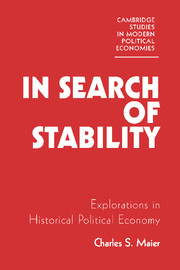Book contents
- Frontmatter
- Contents
- Acknowledgments
- Introduction: Political economy and history
- Part I Ideology and economics from World War I to midcentury
- 1 Society as factory
- 2 The economics of Fascism and Nazism
- 3 The politics of productivity: foundations of American international economic policy after World War II
- 4 The two postwar eras and the conditions for stability in twentieth-century Western Europe
- Part II Collective preferences and public outcomes
- Conclusion: why stability?
- Index
3 - The politics of productivity: foundations of American international economic policy after World War II
Published online by Cambridge University Press: 15 December 2009
- Frontmatter
- Contents
- Acknowledgments
- Introduction: Political economy and history
- Part I Ideology and economics from World War I to midcentury
- 1 Society as factory
- 2 The economics of Fascism and Nazism
- 3 The politics of productivity: foundations of American international economic policy after World War II
- 4 The two postwar eras and the conditions for stability in twentieth-century Western Europe
- Part II Collective preferences and public outcomes
- Conclusion: why stability?
- Index
Summary
The theme introduced here has been taken up by other authors, especially in regard to Italy. See Pier-Paolo D'Attorre, “Aspetti dell' attuazione del Piano Marshall in Italia,” in Elena Aga Rossi, ed., II Piano Marshall e l'Europa (Rome: Instituto della Enciclopedia Italiana, 1983), 163–80; and Mariuccia Salvati, Stato e industria nella ricostruzione: Alle origini del potere democristiano (Milan: Feltrinelli, 1982). On the impact on trade unions see the essay by Federico Romero, “Postwar Reconversion Strategies of American and Western European Labor,” European University Institute Working Paper, no. 85/193 (San Domenico di Fiesole, September 1985). Since this article appeared, I have continued a study of the United States and postwar reconstruction in Europe, which will develop further the argumentation and evidence introduced here.
The ground rules of a liberal international economic system may establish formal equality among participants but they also reflect the disparity of power and resources. Just as significant, they reveal the inequalities and conflicts within the dominant national societies of the system. The primary objective of this chapter is to suggest how the construction of the post–World War II Western economy under United States auspices can be related to the political and economic forces generated within American society. A second focus must be to demonstrate how those American impulses interacted with the social and political components of other nations, both European and Japanese.
The close of World War II brought American policy makers a rare and heady opportunity to reshape the guidelines of the international economic order. The pretensions of the Axis powers to organize continental Europe and East Asia had collapsed.
- Type
- Chapter
- Information
- In Search of StabilityExplorations in Historical Political Economy, pp. 121 - 152Publisher: Cambridge University PressPrint publication year: 1988
- 2
- Cited by



